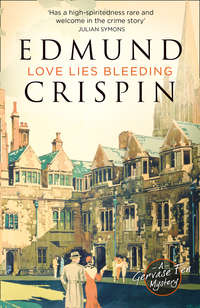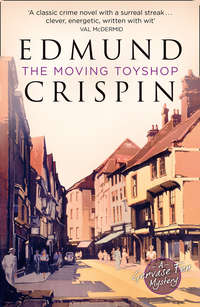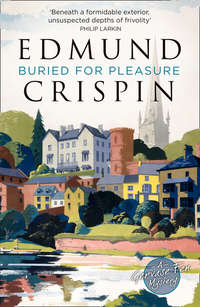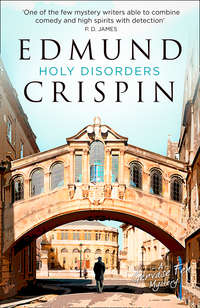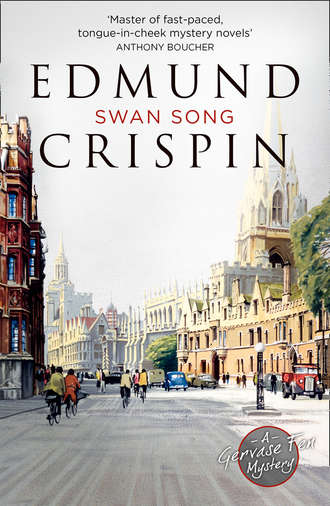
Полная версия
Swan Song
The honeymoon, which followed the Rosenkavalier production, gave him a respite, and when he and Elizabeth returned from Switzerland to set up house in Tunbridge Wells they were too much occupied with organizing their joint ménage to worry about anything else. Shorthouse, presumably, would be simmering down by now; and luckily, their engagements kept the two men apart until November, when both of them were signed up for Don Pasquale. Adam went to the first rehearsal with mild apprehension, and returned perplexed.
‘Well?’ Elizabeth demanded as she helped him off with his coat.
‘The answer is in the affirmative. Edwin would seem to be cured. All the same …’ Adam, who had just removed his hat, absent-mindedly put it on again. ‘All the same …’
‘Darling, what are you doing? Was he friendly? You don’t sound at all sure about it.’ They went into the drawing-room, where a huge fire was burning, and Elizabeth poured sherry.
‘He was friendly,’ Adam explained, ‘in the most overpowering fashion. I don’t like it. In the old days Edwin’s notion of friendship was to bore one perennially with rambling, pointless anecdotes about his professional experiences. He no longer does that – with me, anyway.’
‘Perhaps he’s ashamed of himself.’
‘It’s scarcely likely.’
‘I don’t see why not. He can’t be quite devoid of humanity. Presumably he had a mother.’
‘Heliogabalus had a mother. We all had mothers … What I mean to say is that there’s something artificial about this change in Edwin, it’s decidedly insincere.’
‘But better, one supposes, than open warfare.’
‘I don’t know,’ said Adam dolefully. ‘I’m not at all sure about that. It’s the kiss of Judas, if you ask me.’
‘Don’t be melodramatic, darling, and above all, don’t slop your sherry on to the carpet.’
‘I never noticed I was doing that,’ said Adam.
‘In any case,’ Elizabeth went on, ‘I don’t see what High priest Edwin can have betrayed you to.’
‘Levi, perhaps.’
‘The only qualification Levi has for the part is his race. And anyway, he’d as soon get rid of Edwin as you.’
‘You’re perfectly right, of course.’ Adam frowned. ‘Well, I’ll see how things turn out. Have you got any news?’
‘A commission, darling, and a very profitable one. By the afternoon post.’
‘Oh? Congratulations. A new novel?’
‘No, a series of interviews for a Sunday paper.’
‘Interviews with whom?’
‘Private detectives.’
‘Detectives?’ Adam was startled.
Elizabeth kissed him, a little absently, on the tip of the nose. ‘You’ve still got a lot to learn about me, my precious. Didn’t you know that my first books were works of popular criminology? I’m generally supposed to understand something about the subject.’
‘And do you?’
‘Yes,’ said Elizabeth. ‘I do … Unfortunately it’ll involve a certain amount of gadding about, and I shall have to settle down with Who’s Who and write a lot of tiresome letters tomorrow morning. Do you know any private detectives?’
‘There’s one.’ Adam spoke rather dubiously. ‘A man called Fen.’
‘I remember. There was some business about a toyshop, before the war. Where does he live?’
‘In Oxford. He’s Professor of English there.’
‘You must give me an introduction.’
‘He’s very unpredictable,’ said Adam, ‘in some ways. Are you in a hurry with these articles?’
‘Not specially.’
‘Well,’ said Adam, ‘there’s this Oxford production of Meistersinger in the new year. If it suits you, we’ll get hold of him then.’
The rehearsals of Don Pasquale passed off without incident. Shorthouse, without actually seeking Adam’s company, maintained his curious affability whenever circumstances made a meeting inevitable. And there came a time when he even went so far as to apologize for his earlier behaviour.
It was immediately after the second performance. Adam had lingered for a few minutes in the wings arguing with the producer about some minor awkwardness which had arisen during the evening, and on entering his dressing-room he was surprised to find Shorthouse there, inspecting, or possibly on the point of purloining, a half-empty jar of removing-cream. This, however, he returned hastily to its place when Adam appeared. He was wearing a voluminous dressing-gown and was still powdered, painted, and be-wigged for the name part of the opera, and Adam supposed that he had run short of removing cream and, their dressing-rooms being adjacent, had decided that this was the simplest way of replenishing his supply. It soon appeared, however, that removing-cream must be, at the most, only a subsidiary reason for his visit.
‘Langley,’ he said (and the air at once became aromatic with gin), ‘I’m afraid you’ve no reason to be fond of me. The fact is, I didn’t behave very well over your marriage.’
Adam, embarrassed, made a dull grunting sound. Shorthouse seemed to find this inspiriting, for he went on, with rather more confidence:
‘I came here tonight to apologize. To apologize,’ he repeated, sensing perhaps a certain bareness in his original statement. ‘For my ill-mannered behaviour,’ he added explanatorily after some thought.
‘Don’t think about it,’ Adam mumbled. ‘Please don’t think about it. I’m only too glad—’
‘We can be friends, I hope?’
‘Friends?’ Adam spoke without enthusiasm. ‘Yes, of course.’
‘It’s very generous of you to take it so well.’
‘Don’t think about it,’ said Adam again.
A silence fell. Shorthouse shifted from one foot to the other. Adam removed his wig and hung it with unnecessary deliberation on the back of a chair.
‘Good house tonight,’ said Shorthouse.
‘Yes, very good. They seemed to be enjoying themselves very much. They laughed,’ Adam pointed out, ‘quite a lot.’
‘Of course, it’s a brilliant piece.’
‘Brilliant.’
‘But I suppose from your point of view – that’s to say, there are better parts than Ernesto.’
‘Oh, I don’t know. I’ve got Cercherò lontana terra in the second act.’
‘Yes, so you have … Well,’ said Shorthouse, ‘I’ll go and get some of this muck off my face.’
‘Are you out of cream? I thought I saw—’
‘No, no, thanks very much. I was only wondering what kind you used. Well, I’ll see you tomorrow.’
‘Yes,’ said Adam helplessly. ‘See you tomorrow.’
And Shorthouse lumbered from the room, leaving Adam greatly relieved at his departure. As he changed, Adam pondered Shorthouse’s sudden regeneracy. He continued pondering it all the way back to Tunbridge Wells. Arrived home, he narrated the events of the evening to Elizabeth.
‘Removing-cream?’ said Elizabeth indignantly. ‘He wasn’t trying to pinch that new jar I bought for you?’
‘No,’ Adam reassured her. ‘The old one. Yours was still in my coat-pocket. All the same, I shall keep my dressing-room locked from now onwards.’
‘Well then, the whole ridiculous business is over.’
‘I suppose so. But you know, my dear, I still don’t trust the man. He’s quite capable of playing Tartuffe if it suits his book. I’m not sure, if it comes to that, that he isn’t capable of murder.’
Adam spoke carelessly. But he was to find soon enough that Edwin Shorthouse was by no means unique in this.
Chapter Three
Adam and Elizabeth travelled up to Oxford on a raw, bleak afternoon late in January. The sky was pigeon-grey and the wind chilling. Adam, fretful at the possibility of hoarseness, was wound up in mufflers, but luckily their trains were adequately heated. From Oxford station they took a taxi to the ‘Mace and Sceptre’, where they had reserved rooms. Adam stood about and smoked while Elizabeth unpacked and put away their things. Afterwards they went downstairs to the bar, where they were pleased to find Joan Davis, sipping a dry Martini at one of the glass-topped tables.
From her Adam learned various details of the Meistersinger production.
Edwin Shorthouse was to play Sachs; the Walther and Eva were of course Adam and Joan; Fritz Adelheim, a young German, had the part of David, and John Barfield that of Kothner.
‘And this man Peacock, who’s conducting,’ said Adam. ‘Have you met him?’
‘My dear, yes. Very young but utterly charming. This is his first Big Chance, so you must forget all about what you did under Bruno and Tommy, and cooperate zealously.’
‘But is he any good?’
‘That remains to be seen. But I don’t think Levi would have put him in if he weren’t. Levi has quite an eye for operatic conductors.’
‘Who’s producing?’
‘Daniel Rutherston.’
‘As melancholy as ever, I don’t doubt. And Karl is régisseur?’
‘Yes. Very cock-a-hoop about it. You know what a fanatical Wagnerian he is. Come to think of it,’ said Joan, ‘I shan’t be sorry to get back to Wagner now the war-time interdict has lifted … Why was there an interdict, anyway?’
‘It’s a highbrow axiom,’ Adam explained, ‘that Wagner was responsible for the rise of Nazism. If you want to be in the fashion you must refer darkly to the evil workings of the Ring in the Teutonic mentality – though as the whole cycle of operas is devoted to showing that even the gods can’t break an agreement without bringing the whole universe crashing about their ears, I’ve never been able to see what possible encouragement Hitler can have got out of it … But you mustn’t get me on this subject. It’s one of my hobby-horses. You’ve been abroad, Joan, haven’t you?’
‘In America. Playing Bohème and dying of consumption five times weekly. As a matter of fact, I nearly died of over-eating. You should go to America, Adam. They have food there.’
The three of them passed an agreeable evening together and went early to bed. At ten o’clock next morning piano rehearsals began. Beneath an obstinately cinereous sky Adam and Joan walked to the opera-house in Beaumont Street.
While, in general, the English do not erect opera-houses if they can avoid it – preferring commonly such witty and ennobling occupations as Betty Grable and the football pools – Oxford has recently provided a notable exception to the rule. It stands on the corner of Beaumont Street and St John Street, at the side nearest to Worcester College, and is built of Headington stone. The foyer glows with a discreet, green-carpeted opulence. About it are ranged busts of the greater operatic masters – Wagner, Verdi, Mozart, Gluck, Mussorgsky. There is also one of Brahms – for no very clear reason, though it may perhaps be a tribute to his curious and fortunately abortive project for an opera about gold-mining in the Yukon. The auditorium is comparatively small, but the stage and orchestra-pit are capable of dealing with the grandest of grand opera. The stage equipment is replete with complex and fallible devices, and a menagerie of mechanical fauna inhabits the property-rooms. The dressing-rooms, too, are more luxurious than is usual; the two floors on which they are situated are even served by a small lift.
With such amenities, however, Adam and Joan were not for the moment concerned. They made their way to the stage door, and thence, directed by an aged janitor, to one of the rehearsal rooms.
Most of the others had already arrived, and were grouped round the grand piano. Apart from this, and a number of chairs constructed principally of chromium piping, the place was very bare. Its sole concession to aesthetic decorum was a lopsided photograph of Puccini, markedly resembling the proprietor of an Edwardian ice-cream stall.
Adam was introduced to Peacock, who proved to be a quiet man of about thirty, conventionally dressed, tall, thin, and with a prematurely sparse provision of red hair. Adam liked him immediately. Among the others present were Karl Wolzogen, a wiry little German, preternaturally energetic despite his seventy years; Caithness, at the piano, a dour and laconic Scot; Edwin Shorthouse, exhaling nostalgically the fumes of last night’s gin; and John Barfield, the Kothner. The remainder of the cast were not intimately concerned in the events which followed a fortnight later, and need not be specifically mentioned here. Most of them Adam knew, for the number of operatic singers in England is not large, and they are frequently thrown together.
The rehearsal went as well as such rehearsals do go, and it was pleasing to find that Peacock knew his business. Edwin Shorthouse took direction with such unaccustomed meekness that Adam became suspicious. He remained uneasy, indeed, as long as the piano rehearsals lasted. Such saintly forbearance as Shorthouse was displaying is rare in any singer, and in Shorthouse, Adam reflected, was positively unnatural. He was not altogether surprised, therefore, at the campaign of obstruction which coincided with the beginning of the orchestral rehearsals.
None the less, things went quite smoothly in the early stages, and up to the day of the murder only one incident occurred which it is necessary to relate. The protagonists were Shorthouse, Joan Davis, and a young girl named Judith Haynes.
It was a Monday evening. During the afternoon they had run straight through the last scene of act three, finishing at about six o’clock; and subsequently, Joan Davis remained in the rehearsal-room with Peacock to deal with various loose ends in her own part. Unknown to them, two other people were still in the theatre: Shorthouse, who was drinking heavily in his dressing-room (he had been by no means sober during the afternoon, though, as always, he sang magnificently), and Judith Haynes, a member of the chorus, who had stayed on with a view to altering her costume which fitted badly.
At seven Peacock left, and Joan went up to her dressing-room to fetch a coat and scarf. In the chorus dressing-room she found Shorthouse, exceedingly drunk, doing his best to remove the clothes from Judith Haynes, who was struggling inexpertly with him. Joan – by no means a puny or a nervous woman – acted with vigour and promptness. In falling, Shorthouse caught his head on the angle of the door, and this contributed a good deal to quietening him. In fact, he lay without moving.
‘And that is that,’ said Joan, gazing at his supine form with workmanlike pride. She turned to the girl, who was dealing, scarlet-faced, with buttons and shoulder-straps, Joan saw that she was slender, fair, and young. ‘Are you all right, my dear?’
‘Y-yes, thank-you,’ Judith stammered. ‘I – I don’t know what I should have done if you hadn’t come along. I – He’s not –?’
‘No, no,’ Joan reassured her. ‘Breathing stertorously and very much alive. You’d better go home, hadn’t you?’
‘Yes. I – I don’t know how to thank you.’ Judith hesitated, and then added with a rush: ‘Please – please don’t tell anyone about this, will you? I should hate anyone to know …’
Joan frowned slightly. ‘If it weren’t a bit too late to get a substitute, I should see to it that Edwin was kicked out of this production.’
‘No, you mustn’t.’ Judith spoke with surprising vehemence. ‘I should be so ashamed if people knew …’
Being above all a practical woman, Joan was momentarily puzzled. ‘Ashamed? But you’re not to blame, child. Why on earth –?’
‘It’s just – oh, I don’t know. But please – please promise.’ Joan shrugged her shoulders and smiled. ‘Of course, if you want it that way. Where do you live? If it isn’t too far, I’ll walk home with you.’
‘It’s awfully kind, but you really needn’t bother …’
‘Nonsense,’ said Joan. ‘I should like to. It’s half an hour yet before my dinner-time.’
Judith was recovering her self-possession slowly. ‘What about’ – she nodded towards Shorthouse – ‘him?’
‘We’ll leave him,’ said Joan cheerfully. ‘Edwin is unfortunately one of those people who always recover from things … Have you got a coat? Then let’s make a move.’
On the way to Judith’s lodgings in Clarendon Street, Joan learned a little more about it. It appeared that Shorthouse had been making some kind of advances ever since rehearsals began, and that Judith, though repulsing these, had been too shy of his professional eminence to be actively rude to him. Moreover, there was a young man – also in the chorus – who had aspirations as a composer of opera, and Judith had thought that Shorthouse might be able to help or advise him.
‘I’ll advise him, my dear.’ said Joan. ‘And so will Adam, on pain of instant excommunication. But as to helping – well, virtually the only way to get a new opera put on is to be a multi-millionaire.’
She was very thoughtful as she walked back to the ‘Mace and Sceptre’. Edwin Shorthouse plainly was heading for a shipwreck from which not even his voice and his artistry would save him. It was a pity, Joan thought, that she could not assist in propelling him on to the rocks by publicizing this evening’s occurrence, but a promise was a promise. That she was obliged at least to break it was due to circumstances which few people could have foreseen.
Chapter Four
Presently the orchestral rehearsals began, and with them, trouble.
Adam sighed windily, took out a packet of Spearmint chewing-gum, and placed part of its contents slowly in his mouth. His gaze, roving over the auditorium, came to rest on John Barfield, who was slumped in one of the front stalls, gobbling a ham sandwich and dropping the crumbs down the front of his waistcoat. The rapid and rhythmical movement of his jaws was obscurely fascinating. Adam stared until Barfield looked up sharply and caught his eye; then turned, with some dignity, to reconsider what was going on on the stage.
Or rather, what was not going on. ‘It is extraordinary,’ thought Adam, ‘that Edwin is able to find something wrong even when he’s only sitting still, singing a monologue.’ The cause of the present stoppage had eluded Adam in the first instance, but it appeared from the logomachy that was now in progress that it had something to do with tempo. ‘Naturally I defer to you absolutely, Mr Peacock,’ Shorthouse was saying without a hint of deference across the footlights. ‘It’s simply that I’ve not been used to such a marked accelerando at that point, and I felt that Sachs’ dignity was rather lessened by it.’
George Peacock fidgeted with his baton and looked harassed. And well he might, Adam reflected: rehearsing Die Meistersinger with Edwin Shorthouse in the cast had unnerved many an older and more experienced conductor. It was really all a great pity; Peacock was an able young man; this production would certainly be important to his career; and after four weeks’ nagging by Edwin Shorthouse he might easily make a mess of the actual show. Moreover – Adam glanced at his watch – time was getting on; they still had the third act to get through that afternoon.
‘Why, in the name of God,’ he whispered to Joan Davis, ‘can’t Edwin shut his trap for ten minutes at a time?’
Joan nodded briskly. ‘Inelegantly put,’ she returned, ‘but I could scarcely agree with you more. I’m very sorry for that young man. It’s just the greatest pity in the world that Edwin happens to be so good.’
‘He wouldn’t have lasted five minutes if he hadn’t been,’ said Adam. ‘And I’m inclined to think that someone may stick a knife in him yet.’
‘… So if you’ve got no objection,’ Peacock was saying from the rostrum, ‘we’ll keep it as it was. I think the extra impetus is wanted at that point.’
‘Of course,’ said Shorthouse. ‘Of course. I must try to follow your beat more closely. If I might have a more definite down-stroke at “springtime’s behest”—’
‘Ass,’ Joan commented in a vehement whisper from the wings. ‘Contemptible ass. The wretched man’s beat is perfectly clear.’
‘If we have many more hold-ups,’ Adam replied gloomily, ‘we shall never get on to the third act at all. Not that I should be altogether sorry,’ he added as an afterthought. ‘I tried to sing a top A in my bath this morning, and nothing but a sort of whistling sound came out.’
The music began again. Adam had heard it hundreds of times, but still it cast its warm enchantment over him. They reached the disputed passage. Shorthouse was dragging.
‘Now we shall see,’ said Joan.
Peacock tapped with his baton and the orchestra faded into silence. ‘I’m afraid we were a little ahead of you. Mr Shorthouse,’ he said pointedly.
‘Oh, Lord,’ groaned Adam. ‘Not sarcasm. Not sarcasm, you fool.’
The result was as he expected. There was a moment’s dead silence, and then: ‘If my efforts displease you, Mr Peacock,’ said Shorthouse, ‘I would be obliged if you would tell me so in a straightforward way, and not by means of cheap witticisms.’
There was another silence. Peacock flushed scarlet. Then: ‘I think we’ll leave that passage for the moment,’ he said quietly, ‘and go on. We’ll take it from scene four – Eva’s entry. Are you ready, Miss Davis?’ he called.
‘Perfectly,’ Joan called back. ‘Even the pretence of flirting with Edwin,’ she said to Adam, ‘makes me shudder.’
‘Never mind. Perhaps he’ll object to something you do. Then you can give him hell.’
‘How nice that would be,’ said Joan dreamily. ‘But there’s not much hope of it. He only picks on the young and inexperienced, who can’t answer back … Here we go.’
‘Ta-ta,’ said Adam. ‘Meet you under the lime-tree, and don’t bring a friend.’ He returned to his reflexions.
The situation was, in fact, worrying. There could be no doubt that Peacock was breaking up under the strain of incessant objections, interruptions, and superfluous requests for information about tempo, dynamics, and all the paraphernalia which should have been, and in fact had been, settled at the piano rehearsals; doing a complex, five-hour opera is labour enough without any member of the cast’s making a wilful nuisance of himself. What made it more objectionable was that where the opera management was concerned, Shorthouse could twist Peacock round his little finger, for Shorthouse was the box-office attraction, and Peacock virtually a nonentity; so that although nominally Peacock’s word was law …
Adam sighed, took another piece of chewing-gum, and again caught the eye of Barfield, who was beginning to eat a tomato. Barfield grimaced and nodded meaningly at the stage. Adam grimaced back. It was a futile interchange. At the other side of the stage, Shorthouse and Joan chanted mellifluously at one another, while the orchestra tranquillized, with an occasional tender dissonance, in A flat. Adam noticed suddenly how exceptionally well they were playing, and his anger with Shorthouse rose afresh. To calm himself, he took a third piece of chewing-gum. It was a pity the stuff lost its taste so quickly, and became merely rubbery.
A few moments later he was joined by Dennis Rutherston, the producer, and a dark, rather ill-looking young man whom he vaguely remembered as being the apprentice whose sole duty it is, in the first act, to explain (in two words) the absence of Niklaus Vogel from the Masters’ gathering.
‘It’s a trial,’ said Rutherston, ‘not being able to move people when they’re singing. A convention, if you ask me.’ He was a melancholy, youngish man who was never to be seen without a battered trilby hat on his head.
‘It sends one out of tune,’ Adam told him kindly.
‘And what a nuisance Shorthouse is being … The meadow scene’s going to be an unholy muddle,’ Rutherston prognosticated gloomily. ‘These damned apprentices will not stand still when they get to their places. They seem to imagine that if they shift about from foot to foot it produces an appearance of animation. Actually, it looks like a mass attack of incipient D.T.s.’
Beyond them, the music ceased abruptly. ‘Hullo,’ muttered Rutherston. ‘What now?’
‘It seems impossible to rehearse this work for five minutes’ – Peacock’s voice was shaking – ‘without an obbligato of muffled altercation from the wings. Will you please be quiet!’
‘That’s us,’ said Rutherston, faintly surprised. ‘Well, anyway, I must be off.’ As the music started again, he drifted away, followed by the dark young man.




